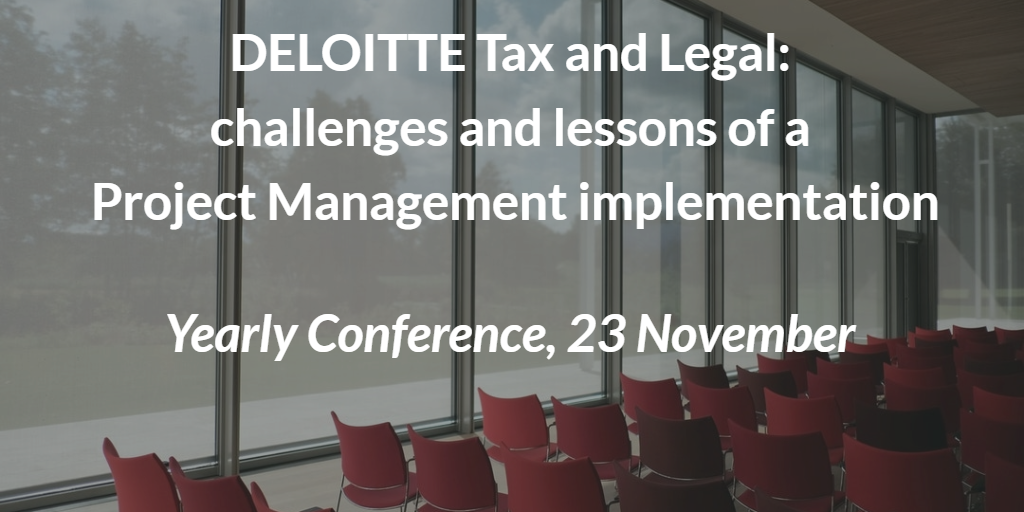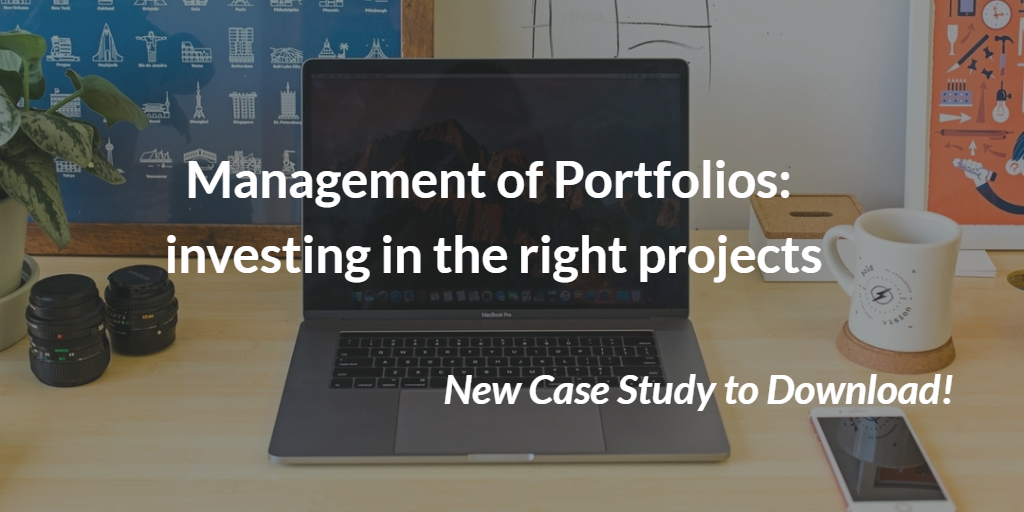News
View the latest inspiring and positive news and information about what's going on in the PM and IT world.

The end of the year is coming closer and many professionals do their best to get certified before the end of the 2017, to start off the new year with the right foot!
Here below a list of all confirmed courses until December: you can find Project, Programme, Portfolio, IT Management and AgilePM courses available!
CONFIRMED COURSES IN NOVEMBER
- Portfolio Management - MoP - English: 13-14-15 November (Brussels) - Info
- Project Management - AgilePM - French: 13-14-15 November (Brussels) - Info
- Project Management - PRINCE2 2017 - English: 13-14-15-16-17 November (Brussels) - Info
- Project Management - AgilePM - English: 20-21-22-23 November (Antwerpen) - Info
- Project Management - PRINCE2 - Dutch: 30 Nov - 1 December 2017 (Gent) - Info
CONFIRMED COURSES IN DECEMBER
- Project Management - AgilePM - English: 4-5-6-7 December (Brussels) - Info
- Project Management - PRINCE2 - French: 4-5-6 December (Brussels) - Info
- Programme Management - MSP - English: 4-5-6-7-8 December (Brussels) - Info
CONTACT US
Looking for a way to train a group of people, like your team or department? Get in touch!

- The “Future of Project Management Professional” report from Axelos identifies the key trends that will impact the project, programme and portfolio management profession, and refers to Democratization of Project Management: “76% of project managers believe project management will become a basic business skill.” This means that Project management will more and more become a basic business skill: every aspect of our roles can be considered in terms of project managing and delivering. “Project management will be used widely by individuals across the whole organization and will be seen as a valuable business skill. This democratization of project management will only enhance the value of project managers, setting them apart as professionals as they evolve their roles to be more strategic and effect change within the business.”
- The “Axelos 2017 PPM Benchmarking Report” has the interesting and insightful title “The value of Project Management Excellence”. This research has identified a lot of challenges facing project managers, but there were also some positive findings too, especially around ongoing development. Continuing professional development (CPD) an activity that is commonly associated across professions such as accountancy, medicine and law and that, however, the majority of project managers recognize as very important for the continuous improvement. The only thing that could hold them back is a lack of investment from organizations; but, if you delve deeper, both individuals and organizations are on the same page: individuals want to do their job more effectively and organizations want to improve the effectiveness of their teams.
3 Webinars to Guide you through Programme, Portfolio and PMO management
WEBINAR - FRIDAY 15 SEPTEMBER - 11h00 - PROGRAMME MANAGEMENT ELEMENTS AND BENEFITS In you are managing bigger-and-bigger projects and driving transformational business change, your next step is Programme Management. MSP, Managing Successful Programmes, represents proven good practice in programme management in successfully delivering transformational change, drawn from the experiences of both public and private sector organisations. MSP defines programme management as “the action of carrying out the coordinated organization, direction and implementation of a dossier of projects and transformational activities (i.e. the programme), to achieve outcomes and realize benefits of strategic importance to the business”. In fact it’s key to understand that a programme is not only a “bigger project”, but can also be a set of coordinated projects. WEBINAR - FRIDAY 29 SEPTEMBER - 11h00 - PORTFOLIO MANAGEMENT: BENEFITS OF STRATEGIC ALIGNMENT If you are a manager with a top-down perspective (you are managing a budget and a team, or a group of strategic initiatives), your next step could be MoP Portfolio Management, a one week training with certification. MoP, Management of Portfolios, provides an overview of all change activities including what is in the portfolio, what it is costing, what risks are faced, what progress is being made, and what the impact is on business as usual and the organization’s strategic objectives. MoP helps you answer the question “Are we doing the right projects?” by prioritizing the right projects and programmes to undertake. WEBINAR - FRIDAY 27 OCTOBER - 11h00 - INTRODUCTION TO PMO MANAGEMENT: ROLES, TECHNIQUES AND BENEFITS If your focus is on improving the way that projects are done (so that more projects succeed and change is more effective), then you should consider P3O, which explains how to use offices to support projects, programs and portfolios. You can facilitate effective portfolio, programme and project management in your organization by implementing a PMO Office. This may be provided through a single permanent office which may exist under several different names e.g. PMO, Portfolio Office, Centre of Excellence, Enterprise or Corporate Programme Office. It may otherwise be provided through a linked set of offices (portfolio office, programme offices, project offices), both permanent (enabling/supporting business objectives and consistency of delivery) and temporary (enabling/supporting specific programmes and projects), providing a mix of central and localized services.
It is with great pleasure that we announce the presence of Deloitte (Tax and Legal department) at the Yearly Project Management conference which will take place in Brussels on November 23rd.
ABOUT THE CONFERENCE - PROJECT MANAGEMENT MATTERS
“Leading organizations across sectors and geographic borders have been steadily embracing project management as a way to control spending and improve project results. When the recession began, this practice became even more important. Executives discovered that adhering to project management methods and strategies reduced risks, cut costs and improved success rates—all vital to surviving the economic crisis.”
This is how the Project Management Institute describes the importance of Project Management in all organizations, and especially in uncertain and risky times like in contemporary economy. Although this seems to be an evident truth, and although many organizations state that they do work with project management principles and strategies, it is still true that:
- For some companies, some established PM processes are in place, but no monitoring or evaluation are foreseen*
- PM is rarely aligned with organization’s objectives*
- The challenges that most PMs emphasize tend to be poor practice, bad planning and bad management decisions*
(*from Axelos_PPM Benchmarking Report 2017)
DELOITTE'S CASE STUDY
With this yearly event QRP International wants to hear the stories of organizations that have implemented Project Management, and specifically decided to start this journey with a well-known method like PRINCE2.
Come and hear the story of Deloitte from the voice of Adriana Bancianu, Senior Manager in Deloitte Tax and Legal Department, and leader of the Global Tax Center Europe's Project Managemenr office (PMO), who from 2010 oversees global teams of Project Managers and tax Specialists. Adriana is now part of the team implementing PRINCE2 as Project Management standard methodology across the Tax Practice of Deloitte Belgium.
"My presentation will be covering the challenges of implementing a project management methodology within a professional services environment. I will explain the audience how Deloitte Belgium Tax and Legal department has managed this change management project, the challenges we faced and the lessons learnt from the 1st phase of the transformation we are still going through."
- Location: Thon Hotel Brussels City Centre – Avenue du Boulevard 17, 1210 Bruxelles
- Time: 9h00 – 13h00- registration starts at 8h30
- Language: English
- Attendance fee: FREE entrance, registration required
- Inscription: to enroll please fill in the form at this page.
Only 60 seats available, make sure you hold your seat!

- Auditory learning: learning through listening and hearing. The expert trainer explains the matter, focusing on the most important parts of the Project Management methodology, highlighting tools and techniques.
- Visual learning: in order to better understand the ideas and concepts, drawings on flip charts can be an important tool to integrate new information. If we take the example of a PRINCE2 training, imagine what impact could have a drawing that explains you the difference between outputs, business change, outcomes and benefits. A picture says more then a thousand words. In some cases, you will even see that these drawings are put on the walls in the training room and are continuously used by the trainer when he/she comes back to this topic.
- Kinesthetic learning: this is what we call “learning by doing”. Classrooms are ideal places to exercise on how to put the theory into practice. Let's take the example of an AgilePM training: an important tool is the PRL (Prioritized Requirements List). What better way to understand how to create this list then to do this in group during the course? It’s a first-hand experience that will help you to put it into practice when you’re back in the office.

A portfolio management approach to business change is required to ensure that organizations prioritize and invest in the changes that contribute most to the strategy. It provides an overview of all change activities including what is in the portfolio, what it is costing, what risks are faced, what progress is being made, and what the impact is on business as usual and the organization’s strategic objectives. Not only Business as Usual prioritization, Management of Portfolio means to effectively decide to invest in the change initiatives that will contribute to deliver strategic objectives.
TITLE: 100 Days to Implement Management of Portfolios
ABOUT THE ARTICLE: "At the Office for National Statistics (ONS) we collect, analyse and publish important statistics such as population, inflation and gross domestic product. This information is used to inform decisions that affect your life and the lives of everyone in the UK. We were aware that some studies indicated a timescale of 12–18 months to implement portfolio management. However, we decided to embark on a 100-day, high-energy approach to implementing the Cabinet Office’s best-practice standard Management of Portfolios (MoP). During the implementation we derived considerable value from enhanced executive portfolio-level information, portfolio prioritization, consistent portfolio investment appraisals and project sequencing. All of this led to a greater understanding of the portfolio delivery landscape and the ability to make more confident investment decisions with an overall increase in collaborative working and organizational energy". This is how Glen Watson, General Director of the Office for National Statistics explains the decision of implementing MoP.
This Case Study follows the steps of the Portfolio implementation highlighting the key phases of this 100 days project: in the terms of the ONS, the path was to "understand where we are" to define "where we want to go": this includes the analysis of the current situation, the definition of the so called "portfolio cycle", "portfolio plan" and "portfolio office". To summarize, at the end of the paper are indicated 8 top tips (in no particular order) which are the things ONS found critically important when implementing portfolio management within 100 days.
ABOUT THE AUTHOR: Craig Kilford worked with the Office for National Statistics as Interim Deputy Director of Portfolio Management. As one of the world’s leading portfolio management subject matter experts he is a regular motivational conference speaker, co-author of the Cabinet Office’s Management of Portfolios and author of "Think P3O." Craig blogs regularly at www.MrPortfolioManagement.com where additional information about this case study is available.
TO READ AND DOWNLOAD THE FULL ARTICLE: simply follow this link!

- the strategic direction of the organization,
- the delivery of change capability by projects,
- the need to maintain business performance and stability while realizing and exploiting the benefits from the investments.
- Vision-led programmes that start with a clearly defined vision, have a top-down approach, and focus on strategic or innovative opportunity with radical transformation of business, culture or both.
- Emergent programmes evolve from current uncoordinated initiatives, where there is recognition of the value of a joinedup approach with an emergent vision and end goal.
- Compliance programmes can also be called ‘must do’ programmes. The organization has no choice but to change; for example, because of market forces or the potential negative impact of not changing.







